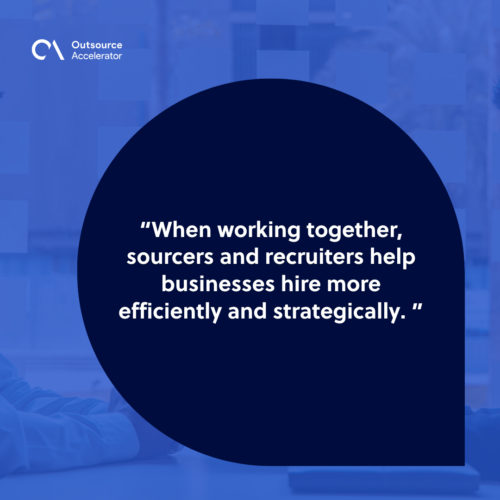Sourcer vs. Recruiter: Which one does your business need?

Hiring the right talent starts with the right strategy, but what happens when a business can’t decide between hiring a sourcer or a recruiter?
For example, a growing tech startup needs specialized developers but lacks the bandwidth to handle interviews and onboarding. The team debates whether to bring in a sourcer to build a talent pipeline or a recruiter to manage the entire hiring process.
The delay creates gaps in productivity and slows down project timelines.
Knowing and understanding the difference between a sourcer and a recruiter, and when to use each, can make or break your hiring success.
In this article, we’ll break down the important roles, responsibilities, and advantages of each. If your team’s stuck asking, “Sourcer vs. Recruiter, who do we really need?” this article will help you decide.
3 Main challenges when hiring top talent
Attracting top-tier candidates is no easy task. Even with a clear hiring plan, businesses often face obstacles that slow down the process or lead to missed opportunities.
Companies usually encounter these when trying to hire top talent:
1. Limited talent pool
The most qualified candidates are often already employed or not actively looking. This makes it difficult for businesses to reach them through traditional job postings. Without a solid sourcing strategy, these skilled professionals stay out of reach.
2. Competition from other employers
High-performing candidates receive multiple offers. If your hiring process is slow or your offer lacks value (whether in pay, flexibility, or culture), you risk losing them to faster-moving competitors.
3. Poor candidate experience
A disorganized or lengthy application and interview process can turn off even the most interested candidate. Delays in communication, unclear timelines, or lack of feedback all contribute to a negative impression, leading top talent to walk away.
Overcoming these challenges begins with the right hiring approach. The sourcer vs. recruiter roles can help you build a team that attracts and secures top talent more effectively.

Sourcer vs. Recruiter: Definition of roles
Sourcers focus on the early stages of the hiring process. Their primary role is to identify, research, and engage potential candidates, often before a position is even posted publicly.
They are skilled at uncovering hidden talent and reaching out to passive candidates who may not be actively seeking new opportunities.
A recruiter, on the other hand, manages the full recruitment cycle. Once a sourcer presents qualified leads or once applicants start coming in, the recruiter steps in. Recruiters also handle job postings, salary discussions, background checks, and final offers.
Both roles are essential in finding the right talent, but they serve different parts of the hiring funnel. When working together, sourcers and recruiters help businesses hire more efficiently and strategically.

Sourcer vs. Recruiter: Key differences
While both sourcers and recruiters play critical roles in the hiring process, their responsibilities, goals, and methods differ. These distinctions will enable your team to make more informed hiring decisions and develop more effective talent acquisition strategies.
Here’s a clearer discussion of their unique differences:
| Category | Sourcer | Recruiter |
| Main focus | Finds and attracts potential candidates | Manages the hiring process from start to finish |
| Stage in hiring | Works at the beginning of the hiring funnel | Involved from application through final job offer |
| Tasks | Candidate research, outreach, and pipeline building | Screening, interviewing, coordinating with hiring teams, closing offers |
| Candidate type | Often targets passive candidates not actively applying | Works with both active and passive candidates |
| Tools used | LinkedIn, Boolean searches, sourcing platforms | ATS systems, interview tools, HR platforms |
| Interaction level | Minimal candidate interaction after initial outreach | High interaction—guides candidates through each step |
| Goal | Build a strong pool of qualified leads | Fill open positions with the best-fit candidates |
Knowing the key differences in the Sourcer vs. Recruiter comparison helps you invest resources where they’ll have the most impact.
Sourcer vs. Recruiter: Picking the right talent partner
The right partner depends on your current hiring needs and internal resources. Use the guide below to help decide between a sourcer vs. recruiter:
- Choose a sourcer if:
- You need to build a talent pipeline for future roles.
- Your open positions require hard-to-find, niche skills.
- You’re struggling to attract passive candidates.
- Your internal team can handle interviews, but needs help finding qualified leads.
- Choose a recruiter if:
- You have active openings that need to be filled quickly.
- You want someone to manage the full hiring process from screening to offer.
- Your team lacks the time or experience to conduct interviews.
- You need support in coordinating between hiring managers and candidates.
Some companies may benefit from both roles working together—sourcers bring in talent, and recruiters close the hire. You can select the right talent partner to achieve your business goals by identifying where your hiring process requires the most support.
When weighing sourcer vs. recruiter, consider the scope of your needs and how quickly you want to hire.







 Independent
Independent




